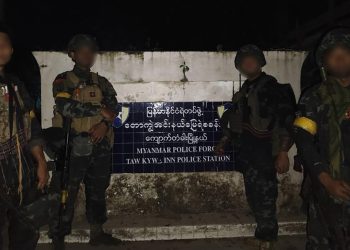Hoteliers in Myanmar’s commercial capital of Yangon and other major cities are selling their properties after the double blow of COVID-19 and a coup left them empty.
Realtor Luxury House advertised on its Facebook page the sale of 27 hotels last month. They have 50 or more rooms and were priced between 300 million and six billion kyats.
Although Myanmar reopened its border to international visitors last year after a two-year ban due to the pandemic, most hotels failed to rebound from the pandemic as post-coup instability kept international visitors away and operational costs soared due to inflation.
Hotels operating on bank loans were burdened with interest when the pandemic forced them to close for two years, and they received few guests after the coup.
Hoteliers have been forced to sell their hotels at a loss to repay loans, tour operators say.
Half of Yangon’s 12 five-star hotels, including the upscale Sule Shangri-La, have been forced to close.
A highly experienced tour operator said: “About the hotels intended for foreign travelers that have been put up for sale, we can divide them into two groups. One of them is built with loans, and another is built with foreign investment. They have to pay salaries for employees, taxes, maintain costs and bank loans though they can’t operate. So, they have been forced to close, and owners are planning to sell them.”
Singaporean state-backed conglomerate Keppel Corp. sold the Sedona Hotel Yangon to Spring Blossom Ventures, a company registered in Singapore, for US$57.4 million, Nikkei Asia reported in March.
Some privately owned hotels in major cities like Yangon and Mandalay have managed to survive because they mainly cater to domestic travelers and have been able to adjust by targeting local holidays.
Owners of hotels that mainly serve international travelers, however, have been forced to sell as they cannot afford to continue operating at a loss, said the tour operator.
“They have to sell as income and costs do not match. They have to sell as there are few visitors,” he said.
The Myanmar regime has been negotiating with its major arms supplier, Russia, to increase visits by Russian tourists to Myanmar, but so far the country has only received Russians who arrive for business, not for pleasure.
Many tour companies have shut down, and others are not renewing their licenses because they have no business.
According to the Myanmar Tourism Federation, there are over 1,900 hotels with 80,000 rooms across Myanmar. Hundreds of hotels in Myanmar’s most popular destinations, like Yangon, Mandalay, Bagan, Chaungtha, Ngwesaung, and Shan State, are reportedly in the process of being put up for sale. Among them are four-star hotels.
Apart from a significant decline in the number of foreign travelers, unremitting power outages and inflation have also taken a toll on hoteliers.
An official at the Myanmar Tourism Federation told The Irrawaddy that during the last tourist season, Myanmar still could not attract foreign visitors due to the political and security situation in the country.
A real estate agent said: “Many hoteliers are making losses. Some have mortgaged their property to banks and they need to pay back their loans. So, there have been more sellers than buyers.”
Those who can afford to pay millions or billions of kyats in this difficult period must be engaged in illegal businesses and are trying to launder money, said the real estate agent.
According to the Hotels and Tourism Ministry of the ousted National League for Democracy government, Myanmar received over 3.5 million foreign visitors in 2018, and nearly 4.4 million foreign visitors in 2019.
The number of foreign tourists visiting Myanmar last year fell to the thousands.
















